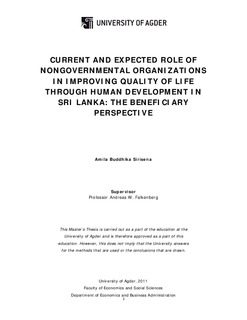| dc.description.abstract | The world has seen a tremendous growth of Non Governmental Organizational activities
during last few decades. Irrespective of being in the industry for so long and having access to
billions and billions of dollars, some argue that NGOs still have not shown satisfactory
progress and therefore questions the effectiveness of NGOs in human development. Quality
of life (QOL) has been long regarded as one of the main indicator of human development.
Hence the main objectives of the study was the determination of the role of NGOs in
improving quality of life of its beneficiaries as well as to identify possible gaps among NGO
and beneficiary interpretation of barriers for a quality life. The study was conducted in
Southern Province of Sri Lanka, employing both quantitative and qualitative methods for
better understanding of the issues. Quantitative study was carried as a survey, where a
researcher administered questionnaire was used among a sample of 215 respondents. Four
focus groups were used for the qualitative study, which each had five respondents.
Quantitative study used 6 main areas, namely Social Freedom, Political Participation,
Economic Access, Community Involvement and Personal Development to evaluate the role
of NGOs. It concludes that NGOs should refrain themselves working related to securing
Political Participation. There is no immediate need to improve Social Freedom; therefore
current silence NGOs maintained in this area should be maintained. NGOs should keep up
the good work and further expand their activities in relation with increasing Economic
Access, increasing Community Involvement and improving Personal Development. While
working with relation to Family Involvement should be done with lot of caution.
Beneficiaries defined Quality of Life as Progress & Flourishing of the Children, ability to
spend a Decent Life and spend that Life with Peace and Harmony. As far as first two
components are concerned, NGOs are in the right track and doing a decent job, even though
there are slight expectation differences. As far as spending a Peaceful and Harmonious life
with family is concerned, NGOs are not expected to play a role. The study finally
recommends the NGOs to apply a marketing oriented strategy by giving due consideration to
donors as well as beneficiaries, thus allowing NGOs to narrow possible mismatches arising
between two groups. This will increase the effectiveness of NGOs in improving quality of
life of its beneficiaries. | en_US |
